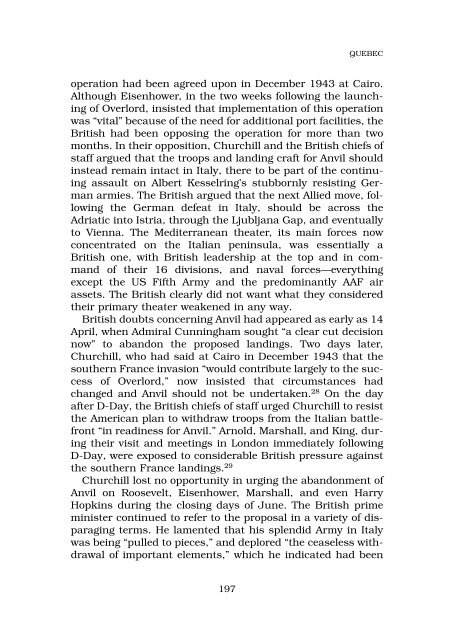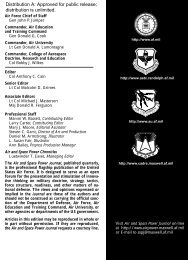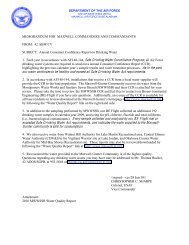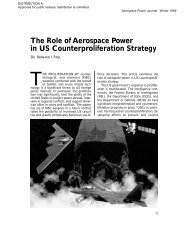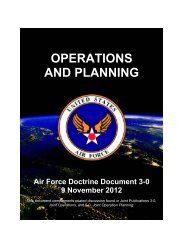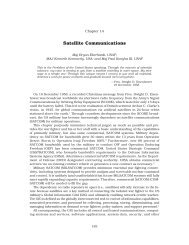- Page 2 and 3:
American Airpower Comes of Age Gene
- Page 4 and 5:
This volume is dedicated to my wife
- Page 6 and 7:
Contents Chapter Page DISCLAIMER .
- Page 8 and 9:
Foreword This volume has richly enh
- Page 10 and 11:
About the Editor Major General John
- Page 12 and 13:
Preface Although the need for a com
- Page 14 and 15:
Acknowledgments As all researchers
- Page 16 and 17:
Editorial Notes Several years ago,
- Page 18 and 19:
spellings of proper names or places
- Page 20 and 21:
Hap at Midpoint Since becoming chie
- Page 22 and 23:
HAP AT MIDPOINT As was the case wit
- Page 24 and 25:
HAP AT MIDPOINT ment to the Mediter
- Page 26 and 27:
HAP AT MIDPOINT whatever his previo
- Page 28 and 29:
HAP AT MIDPOINT the chief of staff.
- Page 30 and 31:
HAP AT MIDPOINT Notes 1. Wesley Fra
- Page 32 and 33:
Chapter 6 England 31 August-8 Septe
- Page 34 and 35:
ENGLAND were handicapped by a lack
- Page 36 and 37:
ENGLAND Arnold had informed the JCS
- Page 38 and 39:
ENGLAND the graduates was his secon
- Page 40 and 41:
ENGLAND achievement, sufficient fac
- Page 42 and 43:
ENGLAND best I can for you.” 30 E
- Page 44 and 45:
ENGLAND ments. His crash and death
- Page 46 and 47:
ENGLAND were partially alleviated b
- Page 48 and 49:
ENGLAND Other than the serious loss
- Page 50 and 51:
ENGLAND cause at the moment. Portal
- Page 52 and 53:
ENGLAND little interest to the resi
- Page 54 and 55:
ENGLAND tance 1,600 miles. Took off
- Page 56 and 57:
ENGLAND Met his staff and went thro
- Page 58 and 59:
ENGLAND reloading in three minutes
- Page 60 and 61:
ENGLAND Had talk with Admiral Nevil
- Page 62 and 63:
ENGLAND Met Mickelson, Balchen, Coc
- Page 64 and 65:
ENGLAND Arnold’s thinking. This i
- Page 66 and 67:
ENGLAND offense at Arnold’s comme
- Page 68 and 69:
ENGLAND as the Regensburg-Schweinfu
- Page 70 and 71:
ENGLAND weather that set in and app
- Page 72 and 73:
ENGLAND hower, was not to be missed
- Page 74 and 75:
ENGLAND 45. Copp, 365. The apron-li
- Page 76 and 77:
ENGLAND 80. Note the contrast from
- Page 78 and 79:
ENGLAND Alan Crouchman, and Vic Mas
- Page 80 and 81:
ENGLAND 113. Maj Gen Barney McK. Gi
- Page 82 and 83:
ENGLAND to May 1945 (1951; new impr
- Page 84 and 85:
ENGLAND Arnold. Balchen had succeed
- Page 86 and 87:
Chapter 7 Cairo, Tehran, Palestine,
- Page 88 and 89:
CAIRO, TEHRAN, PALESTINE, CAIRO, IT
- Page 90 and 91:
CAIRO, TEHRAN, PALESTINE, CAIRO, IT
- Page 92 and 93:
CAIRO, TEHRAN, PALESTINE, CAIRO, IT
- Page 94 and 95:
CAIRO, TEHRAN, PALESTINE, CAIRO, IT
- Page 96 and 97:
CAIRO, TEHRAN, PALESTINE, CAIRO, IT
- Page 98 and 99:
CAIRO, TEHRAN, PALESTINE, CAIRO, IT
- Page 100 and 101:
CAIRO, TEHRAN, PALESTINE, CAIRO, IT
- Page 102 and 103:
CAIRO, TEHRAN, PALESTINE, CAIRO, IT
- Page 104 and 105:
CAIRO, TEHRAN, PALESTINE, CAIRO, IT
- Page 106 and 107:
CAIRO, TEHRAN, PALESTINE, CAIRO, IT
- Page 108 and 109:
CAIRO, TEHRAN, PALESTINE, CAIRO, IT
- Page 110 and 111:
CAIRO, TEHRAN, PALESTINE, CAIRO, IT
- Page 112 and 113:
CAIRO, TEHRAN, PALESTINE, CAIRO, IT
- Page 114 and 115:
CAIRO, TEHRAN, PALESTINE, CAIRO, IT
- Page 116 and 117:
CAIRO, TEHRAN, PALESTINE, CAIRO, IT
- Page 118 and 119:
CAIRO, TEHRAN, PALESTINE, CAIRO, IT
- Page 120 and 121:
CAIRO, TEHRAN, PALESTINE, CAIRO, IT
- Page 122 and 123:
CAIRO, TEHRAN, PALESTINE, CAIRO, IT
- Page 124 and 125:
CAIRO, TEHRAN, PALESTINE, CAIRO, IT
- Page 126 and 127:
CAIRO, TEHRAN, PALESTINE, CAIRO, IT
- Page 128 and 129:
CAIRO, TEHRAN, PALESTINE, CAIRO, IT
- Page 130 and 131:
CAIRO, TEHRAN, PALESTINE, CAIRO, IT
- Page 132 and 133:
CAIRO, TEHRAN, PALESTINE, CAIRO, IT
- Page 134 and 135:
CAIRO, TEHRAN, PALESTINE, CAIRO, IT
- Page 136 and 137:
CAIRO, TEHRAN, PALESTINE, CAIRO, IT
- Page 138 and 139:
CAIRO, TEHRAN, PALESTINE, CAIRO, IT
- Page 140 and 141:
CAIRO, TEHRAN, PALESTINE, CAIRO, IT
- Page 142 and 143:
CAIRO, TEHRAN, PALESTINE, CAIRO, IT
- Page 144 and 145:
CAIRO, TEHRAN, PALESTINE, CAIRO, IT
- Page 146 and 147:
CAIRO, TEHRAN, PALESTINE, CAIRO, IT
- Page 148 and 149:
CAIRO, TEHRAN, PALESTINE, CAIRO, IT
- Page 150 and 151:
Chapter 8 England, Normandy Beaches
- Page 152 and 153:
ENGLAND, NORMANDY BEACHES, ITALY pl
- Page 154 and 155:
ENGLAND, NORMANDY BEACHES, ITALY ai
- Page 156 and 157:
ENGLAND, NORMANDY BEACHES, ITALY Br
- Page 158 and 159:
ENGLAND, NORMANDY BEACHES, ITALY th
- Page 160 and 161:
ENGLAND, NORMANDY BEACHES, ITALY fo
- Page 162 and 163:
ENGLAND, NORMANDY BEACHES, ITALY fe
- Page 164 and 165:
ENGLAND, NORMANDY BEACHES, ITALY en
- Page 166 and 167: ENGLAND, NORMANDY BEACHES, ITALY we
- Page 168 and 169: ENGLAND, NORMANDY BEACHES, ITALY ov
- Page 170 and 171: ENGLAND, NORMANDY BEACHES, ITALY (1
- Page 172 and 173: ENGLAND, NORMANDY BEACHES, ITALY de
- Page 174 and 175: ENGLAND, NORMANDY BEACHES, ITALY co
- Page 176 and 177: ENGLAND, NORMANDY BEACHES, ITALY It
- Page 178 and 179: ENGLAND, NORMANDY BEACHES, ITALY My
- Page 180 and 181: ENGLAND, NORMANDY BEACHES, ITALY la
- Page 182 and 183: ENGLAND, NORMANDY BEACHES, ITALY Co
- Page 184 and 185: ENGLAND, NORMANDY BEACHES, ITALY Tw
- Page 186 and 187: ENGLAND, NORMANDY BEACHES, ITALY we
- Page 188 and 189: ENGLAND, NORMANDY BEACHES, ITALY th
- Page 190 and 191: ENGLAND, NORMANDY BEACHES, ITALY If
- Page 192 and 193: ENGLAND, NORMANDY BEACHES, ITALY 21
- Page 194 and 195: ENGLAND, NORMANDY BEACHES, ITALY 46
- Page 196 and 197: ENGLAND, NORMANDY BEACHES, ITALY in
- Page 198 and 199: ENGLAND, NORMANDY BEACHES, ITALY St
- Page 200 and 201: ENGLAND, NORMANDY BEACHES, ITALY 11
- Page 202 and 203: ENGLAND, NORMANDY BEACHES, ITALY 13
- Page 204 and 205: Chapter 9 Quebec 11 September-16 Se
- Page 206 and 207: QUEBEC out restrictions that had be
- Page 208 and 209: QUEBEC “now established by the Su
- Page 210 and 211: QUEBEC explained to Spaatz, the RAF
- Page 212 and 213: QUEBEC Churchill’s statements wit
- Page 214 and 215: QUEBEC one member of the American J
- Page 218 and 219: QUEBEC also explained in part by si
- Page 220 and 221: QUEBEC edged in the Combined Bomber
- Page 222 and 223: QUEBEC (2) Change in command of Str
- Page 224 and 225: QUEBEC Russian operations in the Ba
- Page 226 and 227: QUEBEC white man doing the same to
- Page 228 and 229: QUEBEC problems in January 1945 wou
- Page 230 and 231: QUEBEC and third World War II visit
- Page 232 and 233: QUEBEC 28. Martin Gilbert, Winston
- Page 234 and 235: QUEBEC ing) but that delivery dates
- Page 236 and 237: QUEBEC We had to regain on the fiel
- Page 238 and 239: QUEBEC 74. Apparently Churchill mad
- Page 240 and 241: Chapter 10 Paris, Cannes, Italy, No
- Page 242 and 243: PARIS, CANNES, ITALY, NORTH AFRICA,
- Page 244 and 245: PARIS, CANNES, ITALY, NORTH AFRICA,
- Page 246 and 247: PARIS, CANNES, ITALY, NORTH AFRICA,
- Page 248 and 249: PARIS, CANNES, ITALY, NORTH AFRICA,
- Page 250 and 251: PARIS, CANNES, ITALY, NORTH AFRICA,
- Page 252 and 253: PARIS, CANNES, ITALY, NORTH AFRICA,
- Page 254 and 255: PARIS, CANNES, ITALY, NORTH AFRICA,
- Page 256 and 257: PARIS, CANNES, ITALY, NORTH AFRICA,
- Page 258 and 259: PARIS, CANNES, ITALY, NORTH AFRICA,
- Page 260 and 261: PARIS, CANNES, ITALY, NORTH AFRICA,
- Page 262 and 263: PARIS, CANNES, ITALY, NORTH AFRICA,
- Page 264 and 265: PARIS, CANNES, ITALY, NORTH AFRICA,
- Page 266 and 267:
PARIS, CANNES, ITALY, NORTH AFRICA,
- Page 268 and 269:
PARIS, CANNES, ITALY, NORTH AFRICA,
- Page 270 and 271:
PARIS, CANNES, ITALY, NORTH AFRICA,
- Page 272 and 273:
PARIS, CANNES, ITALY, NORTH AFRICA,
- Page 274 and 275:
PARIS, CANNES, ITALY, NORTH AFRICA,
- Page 276 and 277:
PARIS, CANNES, ITALY, NORTH AFRICA,
- Page 278 and 279:
PARIS, CANNES, ITALY, NORTH AFRICA,
- Page 280 and 281:
PARIS, CANNES, ITALY, NORTH AFRICA,
- Page 282 and 283:
PARIS, CANNES, ITALY, NORTH AFRICA,
- Page 284 and 285:
PARIS, CANNES, ITALY, NORTH AFRICA,
- Page 286 and 287:
PARIS, CANNES, ITALY, NORTH AFRICA,
- Page 288 and 289:
PARIS, CANNES, ITALY, NORTH AFRICA,
- Page 290 and 291:
PARIS, CANNES, ITALY, NORTH AFRICA,
- Page 292 and 293:
PARIS, CANNES, ITALY, NORTH AFRICA,
- Page 294 and 295:
PARIS, CANNES, ITALY, NORTH AFRICA,
- Page 296 and 297:
PARIS, CANNES, ITALY, NORTH AFRICA,
- Page 298 and 299:
PARIS, CANNES, ITALY, NORTH AFRICA,
- Page 300 and 301:
PARIS, CANNES, ITALY, NORTH AFRICA,
- Page 302 and 303:
PARIS, CANNES, ITALY, NORTH AFRICA,
- Page 304 and 305:
PARIS, CANNES, ITALY, NORTH AFRICA,
- Page 306 and 307:
PARIS, CANNES, ITALY, NORTH AFRICA,
- Page 308 and 309:
PARIS, CANNES, ITALY, NORTH AFRICA,
- Page 311 and 312:
USAF Photo General Henry H. “Hap
- Page 313 and 314:
USAF Photo Arnold with Maj Gen Ira
- Page 315 and 316:
Photo courtesy of USAF Association
- Page 317 and 318:
Photo courtesy of US Army Hap and h
- Page 319 and 320:
Photo courtesy of National Air and
- Page 321 and 322:
USAF Photo Arnold and his son, Lt W
- Page 323 and 324:
Photo courtesy of US Army General H
- Page 325 and 326:
THIS PAGE INTENTIONALLY LEFT BLANK
- Page 327 and 328:
AMERICAN AIRPOWER COMES OF AGE The
- Page 329 and 330:
AMERICAN AIRPOWER COMES OF AGE had
- Page 331 and 332:
AMERICAN AIRPOWER COMES OF AGE By t
- Page 333 and 334:
AMERICAN AIRPOWER COMES OF AGE thea
- Page 335 and 336:
AMERICAN AIRPOWER COMES OF AGE tion
- Page 337 and 338:
AMERICAN AIRPOWER COMES OF AGE Mich
- Page 339 and 340:
AMERICAN AIRPOWER COMES OF AGE to i
- Page 341 and 342:
AMERICAN AIRPOWER COMES OF AGE Newt
- Page 343 and 344:
AMERICAN AIRPOWER COMES OF AGE Dinn
- Page 345 and 346:
AMERICAN AIRPOWER COMES OF AGE WD t
- Page 347 and 348:
AMERICAN AIRPOWER COMES OF AGE (b)
- Page 349 and 350:
AMERICAN AIRPOWER COMES OF AGE Met
- Page 351 and 352:
AMERICAN AIRPOWER COMES OF AGE mitt
- Page 353 and 354:
AMERICAN AIRPOWER COMES OF AGE essa
- Page 355 and 356:
AMERICAN AIRPOWER COMES OF AGE isla
- Page 357 and 358:
AMERICAN AIRPOWER COMES OF AGE (c)
- Page 359 and 360:
AMERICAN AIRPOWER COMES OF AGE idly
- Page 361 and 362:
AMERICAN AIRPOWER COMES OF AGE I. (
- Page 363 and 364:
AMERICAN AIRPOWER COMES OF AGE Plan
- Page 365 and 366:
AMERICAN AIRPOWER COMES OF AGE Ster
- Page 367 and 368:
AMERICAN AIRPOWER COMES OF AGE Stra
- Page 369 and 370:
AMERICAN AIRPOWER COMES OF AGE 69.
- Page 371 and 372:
AMERICAN AIRPOWER COMES OF AGE 87.
- Page 373 and 374:
AMERICAN AIRPOWER COMES OF AGE 108.
- Page 375 and 376:
AMERICAN AIRPOWER COMES OF AGE Col
- Page 377 and 378:
THIS PAGE INTENTIONALLY LEFT BLANK
- Page 379 and 380:
AMERICAN AIRPOWER COMES OF AGE cont
- Page 381 and 382:
AMERICAN AIRPOWER COMES OF AGE outl
- Page 383 and 384:
AMERICAN AIRPOWER COMES OF AGE airm
- Page 385 and 386:
AMERICAN AIRPOWER COMES OF AGE mark
- Page 387 and 388:
AMERICAN AIRPOWER COMES OF AGE Drov
- Page 389 and 390:
AMERICAN AIRPOWER COMES OF AGE a vi
- Page 391 and 392:
AMERICAN AIRPOWER COMES OF AGE Brit
- Page 393 and 394:
AMERICAN AIRPOWER COMES OF AGE CCS
- Page 395 and 396:
AMERICAN AIRPOWER COMES OF AGE Jewe
- Page 397 and 398:
AMERICAN AIRPOWER COMES OF AGE the
- Page 399 and 400:
AMERICAN AIRPOWER COMES OF AGE sign
- Page 401 and 402:
AMERICAN AIRPOWER COMES OF AGE Most
- Page 403 and 404:
AMERICAN AIRPOWER COMES OF AGE abou
- Page 405 and 406:
AMERICAN AIRPOWER COMES OF AGE Arno
- Page 407 and 408:
AMERICAN AIRPOWER COMES OF AGE rese
- Page 409 and 410:
AMERICAN AIRPOWER COMES OF AGE to G
- Page 411 and 412:
AMERICAN AIRPOWER COMES OF AGE bomb
- Page 413 and 414:
AMERICAN AIRPOWER COMES OF AGE Col
- Page 415 and 416:
AMERICAN AIRPOWER COMES OF AGE 31.
- Page 417 and 418:
AMERICAN AIRPOWER COMES OF AGE in G
- Page 419 and 420:
AMERICAN AIRPOWER COMES OF AGE 61.
- Page 421 and 422:
AMERICAN AIRPOWER COMES OF AGE 78.
- Page 423 and 424:
AMERICAN AIRPOWER COMES OF AGE 94.
- Page 425 and 426:
THIS PAGE INTENTIONALLY LEFT BLANK
- Page 427 and 428:
AMERICAN AIRPOWER COMES OF AGE abou
- Page 429 and 430:
AMERICAN AIRPOWER COMES OF AGE from
- Page 431 and 432:
AMERICAN AIRPOWER COMES OF AGE ing
- Page 433 and 434:
AMERICAN AIRPOWER COMES OF AGE crea
- Page 435 and 436:
AMERICAN AIRPOWER COMES OF AGE thus
- Page 437 and 438:
AMERICAN AIRPOWER COMES OF AGE seem
- Page 439 and 440:
AMERICAN AIRPOWER COMES OF AGE Gen
- Page 441 and 442:
University of Virginia, Charlottesv
- Page 443 and 444:
Cameron, Rebecca Hancock, Training
- Page 445 and 446:
Webster, Sir Charles, and Noble Fra
- Page 447 and 448:
------. The Second World War, vol.
- Page 449 and 450:
Halder, Franz. The Private War Jour
- Page 451 and 452:
Morison, Samuel Eliot. History of t
- Page 453 and 454:
Tuchman, Barbara W. Stilwell and th
- Page 455 and 456:
THIS PAGE INTENTIONALLY LEFT BLANK
- Page 457 and 458:
Eighth Air Force: 14, 17, 21, 23-25
- Page 459 and 460:
Western Europe: 185 Wiener Neustadt


